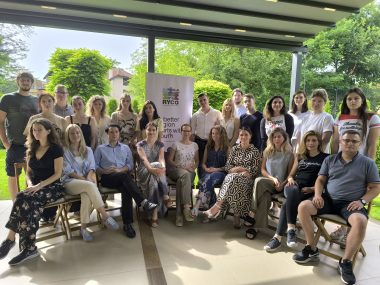Bottom-Up Securitization: Youth and Feminist Activists Combatting Misogyny in Serbian Tabloids
BY RYCOWBORG

Bottom-Up Securitization: Youth and Feminist Activists Combatting Misogyny in Serbian Tabloids
February 7, 2024
Securitization theory
Securitization as a concept in security studies emerged in the 1990’s introduced by Ole Wæver, and further developed together with Barry Buzan and Jaap de Wilde, all representatives of the Copenhagen school (Buzan, Wæver & de Wilde, 1998). In their joint work the authors define security as “the move that takes politics beyond the established rules of the game and frames the issue either as a special kind of politics or as above politics” (ibid., 23). Therefore, securitisation is an act of presenting an issue as an existential threat thus moving it out of the domain of ‘normal’ political debate into the domain of emergency politics (Peoples & Williams, 2021: 116). The essence of the theory lays in the notion that security threats are socially constructed. Furthermore, it relies on social constructivism, as well as the Speech Act Theory derived from the field of linguistics (John Austin, 1962; John Searle 1969, 1979). Buzan et al. (1998: 26) compare the process of securitization with what is called a ‘speech act’ in linguistic theory, proposing that the sole usage of the utterance “security” is an act in itself. Furthermore, by uttering “security” in relation to a certain issue, decision makers attempt a “securitization move”, i.e., moving an issue on a spectrum from non-politicized further to politicized and finally to securitized (Peoples & Williams, 2021: 116). However, an issue cannot be completely securitized if there is no audience to accept it and consent to it as such (Buzan et al. 1998: 25).
Misogyny is common occurrence in the media (especially in the tabloids) in Serbia. Women are bullied, called out for their behavior, physical appearance, choices they make almost daily. The case of I.M. is an interesting one as it was the straw that broke the camel’s back which united woman into raising up against this injustice. In the initial phase, referring back to Salter’s scale, the attempt to securitize I.M.’s release achieved a medium high degree of success because the issue was accepted by the audience as a security one, and the public and media continued monitoring I.M.’s whereabouts as a preventive measure. Moreover, we can assess that the plot did fulfil Wæver’s felicity conditions: there was a traditional securitizing “plot”; the media warned about the threat (I.M.) being “historically threatening”; and some media included segments in the text where “experts” claimed that I.M. will rape again (Informer, 2022d; Nova S, 2022c). In the post-trigger phase, the bottom-up efforts to securitize the misogyny, violation of ethics, and the institutionals’ lack of interest to supervise and adequately punish rapists achieved a medium low degree of success. The issue has been problematized and accepted as a security concern, however, there were no proactive measures taken locally to address the problem. Two felicity conditions were met: the problem followed the traditional “plot”; misogyny has been always omnipresent in media throughout history; however, the securitizing actors did not have enough social capital to convince the authorities to take action. Informer on the other hand, as a media known to be affiliated with the leading establishment, had enough formal support to succeed in spinning the situation to their advantage and market themselves as saviors by contributing to the rearrest of I.M. In the end, the failure to address such systematic societal problems, and the protection of corrupt media are common symptoms of hybrid democracies where the needs of the rulers are often incompatible with those of the ruled. Despite these challenges, it becomes evident that the role of youth and feminist activism stands as a beacon of hope, tirelessly working to raise awareness and incite meaningful change within society.
Author: Katarina Popović
*Youth, Peace and Security Agenda is all about mainstreaming youth opinion and participation in policy and peace dialogs. As a supporter of the YPS Agenda in the region, RYCO provides the space for youth to express their opinions and solutions for sustainable peace. However, views and opinions expressed are those of the author(s) only and do not necessarily reflect those of the RYCO. Neither the RYCO nor the granting authority can be held responsible for them.















